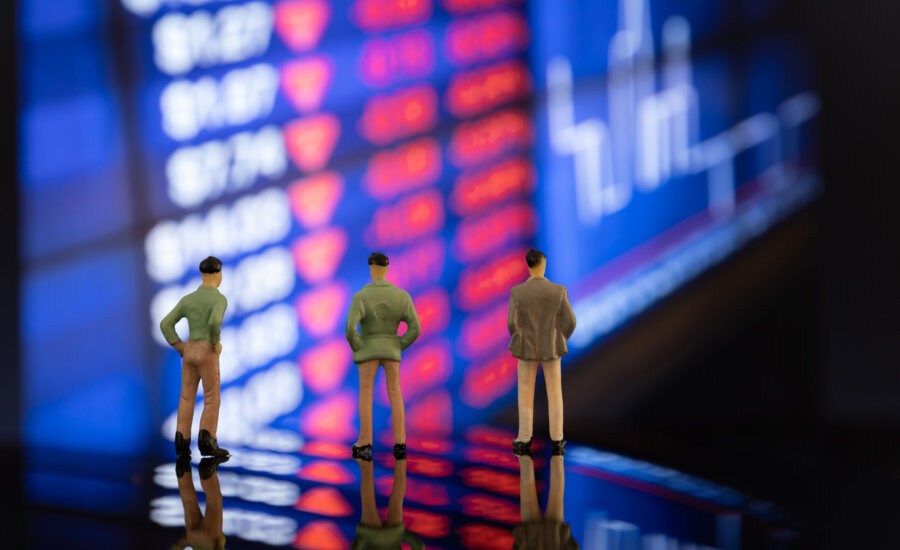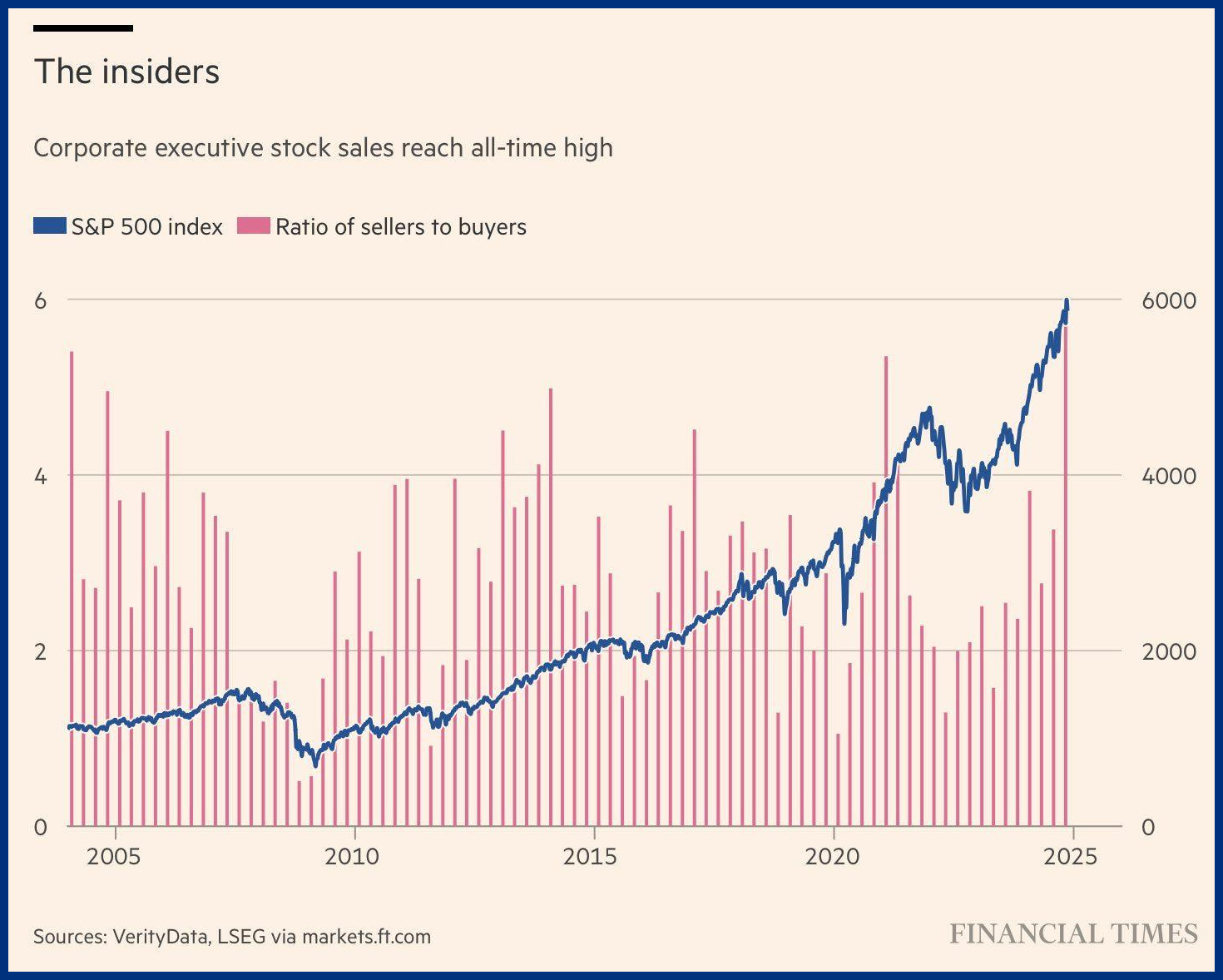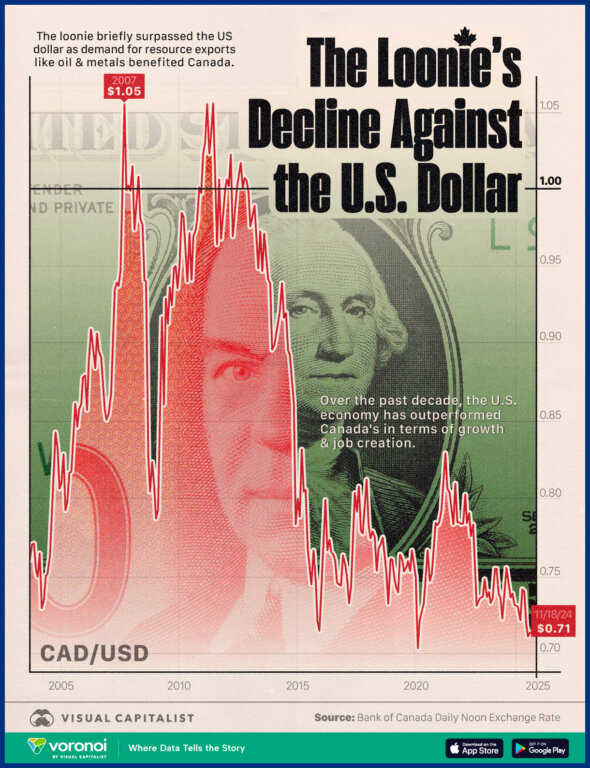Making sense of the markets this week: December 8, 2024
Canada bank earnings remain on target, Dollarama’s expectations catch up to it, “insider selling” sets a new record, and the Canadian dollar is losing the battle compared to the U.S. dollar.
Advertisement
Canada bank earnings remain on target, Dollarama’s expectations catch up to it, “insider selling” sets a new record, and the Canadian dollar is losing the battle compared to the U.S. dollar.

Kyle Prevost, creator of 4 Steps to a Worry-Free Retirement, Canada’s DIY retirement planning course, shares financial headlines and offers context for Canadian investors.
Conventional wisdom is that falling interest rates are good for bank earnings. This week’s earnings reports for Canada’s big banks appear largely to bear that out, but TD continues to underperform.
Here’s how Canadian banks performed in the three months ending October 31st, 2024:
TD was again the loser during this earnings period. Investors were in no mood to cut the company any slack as it not only missed earnings, but would also not be issuing forward guidance for 2025. I take this as the financial-accounting equivalent of throwing your hands up in the air and saying, “We have no freaking idea what will happen.” Not a great look.
TD shares are down more than 13% this year. Despite the negative headlines and the massive loss due to a money laundering fine, we continue to think TD will be a very profitable North American bank going forward. It’s simply a matter of finding the floor on the current valuation, as growth may be tough to come by for a while.
At the other end of the banking spectrum, CIBC capped off an incredible 2024. With the earning beat pop, shares are now up more than 46% year to date. Toss in the dividend, and that’s close to a 50% total return for the year—not too shabby at all.
Provision for credit losses (PCL) is an amount companies charge against income to recognize bad debt. Recording a PCL reduces earnings by creating an expense.
Read the full definition of provision for credit losses (PCL) in the MoneySense Glossary of finance and investing terms.
A common theme across all the banks was slightly higher provision for credit losses (PCLs) than were predicted, but still well within expected ranges. Five banks increased their dividend payments (as good solid Canadian banks are supposed to do), except for Scotiabank. RBC and National Bank hiked theirs by $0.04. TD and BMO by $0.03. CIBC increased by $0.07. [Editor’s note: Apologies, in a previous version, we stated there was dividend for all Big Six banks in Canada. However, Scotiabank paused its dividend.]
Read more about the Big Six bank quarterly earnings reports. And for more of my thoughts on the latest in Canadian banks, check out my article on investing in Canadian bank stocks on MillionDollarJourney.ca.

Get up to 4.00% interest on your savings without any fees.

Lock in your deposit and earn a guaranteed interest rate of 3.55%.

Earn 3.7% for 7 months on eligible deposits up to $500k. Offer ends June 30, 2025.
MoneySense is an award-winning magazine, helping Canadians navigate money matters since 1999. Our editorial team of trained journalists works closely with leading personal finance experts in Canada. To help you find the best financial products, we compare the offerings from over 12 major institutions, including banks, credit unions and card issuers. Learn more about our advertising and trusted partners.
Both Canadian and American dollar stores reported earnings this week.
Dollarama reports in Canadian currency, whereas Dollar Tree and Dollar General report in U.S. dollars.
In a bit of a reversal of what we’ve seen so far in 2024, the American dollar stores had slightly better earnings days than Dollarama. That said, Dollarama had an excellent year and is up nearly 48%, whereas Dollar Tree and Dollar General are down about 48% and 43%, respectively, on the year.
Dollarama’s big announcement was that it’s planning to build a new distribution centre in Calgary over the next few years in order to fuel its Western-Canadian growth. With shares now priced at an expensive price-to-earnings (P/E) ratio of over 35x, this retailer may have a hard time living up to its 2024 record of growth going forward.
Meanwhile, the American dollar stores are focused on streamlining operations and closing underperforming stores in order to increase margins. Tariffs on goods from China and Mexico are a big threat to the bottom lines of American dollar store retailers, as those countries produce a large percentage of low-cost goods that make up the bulk of dollar store inventory.
One of the more interesting pieces of publicly available data when it comes to market sentiment is buying and selling by insiders. (Not to be confused with insider trading—which is the illegal trading of a security using non-public information.) In order to level the playing field as much as possible, publicly traded companies are required to report when executives and board members sell their shares. They are often paid in shares of stock in order to take advantage of preferential tax treatment—ahem, tax loopholes. Consequently, they may sell shares just to put some cash in their pockets. Yachts don’t buy themselves, after all.
On the other hand, when we read headlines like, “Insider sales hit record high,” it makes you think a bit more about what those at the top of the corporate food chain are seeing. After all, if you want to know what the big shots are really thinking, it makes more sense to look at what they do with their own money, as opposed to opinion surveys.

Take Goldman Sachs. Its share price shot up recently, likely due to speculation that a Donald J. Trump American federal administration will cut certain regulations put in place since the 2008 meltdown. Trump’s team already cut banking regulations designed to keep banks solvent in a crisis the last time he was in office. That move almost assuredly contributed to last year’s banking meltdown. It’s probably not a coincidence that just four Goldman Sachs insiders cashed out more than USD$28 million worth of stock since November 6, 2024.
Meanwhile, Tesla’s board director Kathleen Wilson-Thompson took her chips off the table as well, selling USD$34.6 million worth of Tesla stock since the election. It would certainly appear that she is seeing something that the rest of the market is blind to! Add this data point as one more that supports the “we’re closer to the top of the market than the bottom,” prediction we made last week.
If you’ve been planning a trip States-side within the last couple of years, you’ve no likely noticed that our Canadian dollar doesn’t stretch quite as far as it used to. Canadian tourists will have to look back fondly on the days when they could trade in their loonies for greenbacks at par before heading south to find (usually) lower prices on a vacation or shopping trip. Those days appear to be long gone.

The Canadian dollar is down 1.5% since Trump was elected. It now trades at its lowest point since the depths of the pandemic early in 2020.
Back in 2007, foreign currency poured into Canada as we sold oil at commodities at record high prices. While there was a brief flight to U.S. dollar safety during the 2008 crash, the Canadian economy weathered the financial crisis much better than the U.S. did in the years that followed. We remember a lot of vacation homes being bought by wealthy-feeling Canadians in the 2010-2014 period.
Beginning in 2014, though, oil prices began to drop, and U.S. productivity (led by its tech dominance) skyrocketed. Foreign investment into the States has been absolutely massive, and its economy is firing on all cylinders. Meanwhile, Canadian productivity has been anemic.
With Trump obsessed with tariffs (and apparently open to the idea of Canada becoming the 51st state), the immediate future doesn’t look bright for the loonie. Several experts are predicting it will fall even further in 2025, as the Bank of Canada lowers interest rates and makes it less attractive to hold currency in a Canadian savings account or bond.
Share this article Share on Facebook Share on Twitter Share on Linkedin Share on Reddit Share on Email
Just a point to correct the statement above made that “All six banks increased their dividend payments”. The Bank of Nova Scotia, actually paused on their dividend and did NOT increase it as we had hoped. It remains at $1.06/share quarterly since the July 2023 QRTLY Dividend.
Thx.
Thank you for flagging our error. This has been fixed.
It seems this article is blaming Trump for Canada’s problems? How about commenting on our Canadian Liberals, they’ve devastated our country where we now have extremely low production, foreign investment and a low dollar. They’ve curtailed our oil & gas and would like to wipe it out completely. We’ve done nothing to help ourselves except raise taxes and initiate new ones. I guess it’s just easier to blame someone else rather than looking inward.